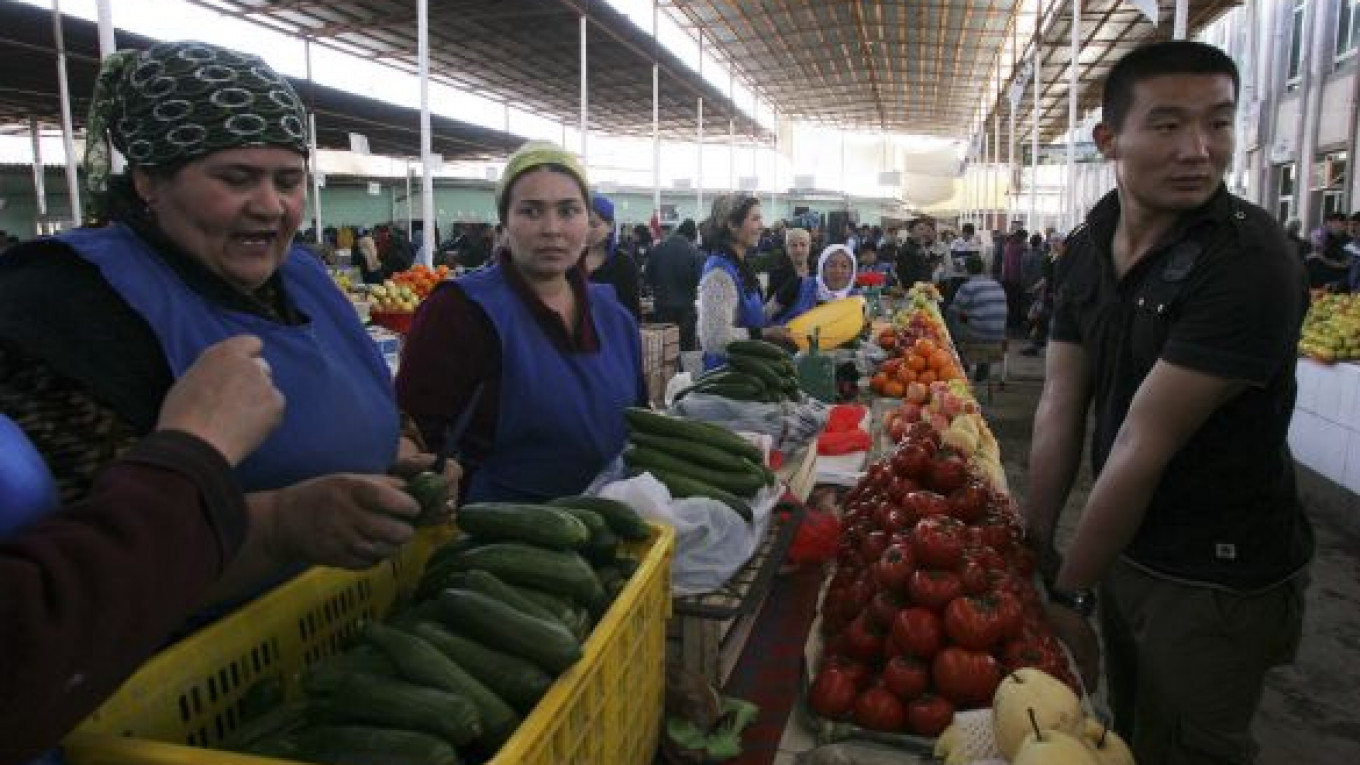Misha, born Wang Shuai, is Chinese. His farming expertise is helping villagers in an impoverished part of southern Tajikistan earn a living growing vegetables.
The land he farms is also Chinese, temporarily at least, under a landmark deal signed this month to lease 2,000 hectares of Tajikistan to Beijing.
The Tajik government has not released financial details of the land lease terms. It says more such agreements are planned. China says it has no territorial ambitions in Central Asia.
"China has no plans to garrison its people in foreign lands in order to farm undeveloped land," Foreign Ministry spokeswoman Jiang Yu said. "Our increasing agricultural cooperation is based on equality and mutual benefit."
Yet China's sheer size and its relentless hunger for raw materials to feed its fast-growing economy mean its influence in the vast mineral-rich region is growing fast. Governments in Central Asia have accepted billions of dollars of Chinese loans in exchange for access to natural resources.
A quarter of Kazakhstan's oil production is Chinese-owned, and Beijing has built a pipeline to pump natural gas from the world's fourth-largest reserves in Turkmenistan. In Tajikistan, a Chinese company is majority owner of the largest gold mine.
China's westward expansion across its 2,800-kilometer border with Central Asia has inflamed passions within the former Soviet region, where opposition activists say governments are giving up too many of their precious resources.
"This process is capable of stirring up tension within the local population, who perhaps cannot accept such a mass influx of Chinese," said Tajik political analyst Zafar Abdullayev.
Tajikistan, where the average monthly wage is only $93, is the poorest of the five former Soviet states in Central Asia. Nearly 40 percent of its gross domestic product is derived from remittances sent home by about 1 million migrant workers.
In the capital, Dushanbe, Chinese firms have won contracts to repair roads and construct the national library and new premises for the Foreign Ministry.
"My husband works in Russia because he can't find work here, while the government is bringing in Chinese to build our roads. How can this be right?" said Zarrina, 35, a Dushanbe resident.
About 6,000 Chinese citizens live in Tajikistan, mainly engaged in building roads and tunnels in the mountainous republic, where arable land is at a premium.
After Russia, China is Tajikistan's biggest trade partner, with an 18 percent share of the country's total trade turnover.
Tajikistan also owes China $700 million, 36 percent of its national debt. Loans from Beijing have been granted with a 20-year repayment period and 2 percent annual interest.
Abdullayev said Tajik President Emomali Rakhmon, like other Central Asian leaders, was using closer ties with Beijing for leverage against Russia and Western countries with an interest in the strategic region bordering Afghanistan.
"Beijing's support is now the main bargaining chip in dialogue between Rakhmon's government and major world powers," the analyst said.
Ties were reinforced this year when the two countries agreed to end a century-old dispute over their border high in the Pamir mountains, reaching an accord that evaded both Tsarist Russia and the Soviet Union.
While Tajikistan's Foreign Ministry heralded the deal to cede only 4 percent of a disputed region the size of Albania as a "great victory" for Tajik diplomacy, opponents accused the government of surrendering sovereign territory.
The Tajik government believes Chinese farming expertise will improve productivity and revitalize the rural communities that are home to three-quarters of the country's 7.5 million people.
Safar Safarov, first deputy chairman of the ruling People's Democratic Party of Tajikistan, said such projects would boost food security in a country that imports 30 percent of its grain.
"It's practically impossible right now to find agricultural produce from Tajikistan in our markets," he said. "We need to feed and water our own people."
Misha, like most Chinese settlers in former Soviet states, has adopted a Russian name. He is the only Chinese citizen in the village of Bustonkala, 100 kilometers south of Dushanbe.
In his jet black T-shirt stretched at the collar, he grows cucumbers and tomatoes inside four greenhouses. This year, he will sow the village's first rice crop.
"I've learned a lot from him about farming, which is helping me grow a good crop," said Rustam Valiyev, a local engineer. "This project has given us work and invaluable experience."
A Message from The Moscow Times:
Dear readers,
We are facing unprecedented challenges. Russia's Prosecutor General's Office has designated The Moscow Times as an "undesirable" organization, criminalizing our work and putting our staff at risk of prosecution. This follows our earlier unjust labeling as a "foreign agent."
These actions are direct attempts to silence independent journalism in Russia. The authorities claim our work "discredits the decisions of the Russian leadership." We see things differently: we strive to provide accurate, unbiased reporting on Russia.
We, the journalists of The Moscow Times, refuse to be silenced. But to continue our work, we need your help.
Your support, no matter how small, makes a world of difference. If you can, please support us monthly starting from just $2. It's quick to set up, and every contribution makes a significant impact.
By supporting The Moscow Times, you're defending open, independent journalism in the face of repression. Thank you for standing with us.
Remind me later.






